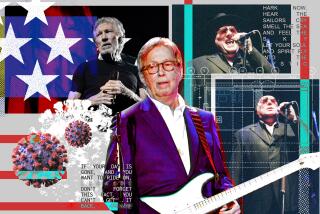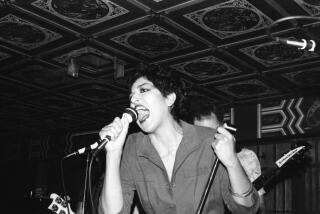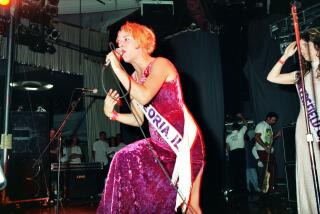‘Rock ‘n’ Roll Is Here to Stay’ : China’s Pop Scene Thrives Underground
- Share via
BEIJING — Willy and Zorro were almost screaming outside the basement disco of an obscure suburban hotel Sunday night, trying to be heard over the Middle Finger Band’s ear-searing rendition of Led Zeppelin’s “Rock and Roll” and trying, in their broken English, to explain just why they started the semi-underground Beijing Rock ‘n’ Roll Club a month ago.
“I was in tourism,” said Willy, who asked that his real Chinese name not be used. “But no tourists.”
“I was in business,” Zorro chimed in. “But no business.”
“And we love rock ‘n’ roll,” Willy said, his entire body swaying to the beat pounding through the disco’s walls.
“But is this legal? “ a visiting American asked.
“It’s sort of in between legal and illegal,” Willy explained with a sly smile. “The government believes that this is bourgeois liberalism, and so it’s got to go. But it won’t. It can’t. The government is still too busy cracking down on other things at the moment. Besides, rock ‘n’ roll has passed the point of no return here.
“In Beijing, my friend, I’m happy to say that rock ‘n’ roll is here to stay.”
Perhaps so. But still, no one is taking any chances--not even Willy and Zorro, the two 25-year-old entrepreneurs who steadfastly refuse to give in to the sweeping political and cultural purge launched by China’s hard-line Communist Party leadership after last spring’s wave of student-led pro-democracy protests.
And, in some ways, Beijing’s nascent rock scene is becoming something of a lingering symbol for those who still long for modernization in Chinese society, as well as a narrow vent for the frustrations of those who have managed to escape the purge.
“We put on at least one rock ‘n’ roll concert each weekend,” Willy said, adding that attendance usually tops 100. “But we move it from place to place every week to keep the police from finding out about it ahead of time.”
The club’s advertising is handled the same way that student leaders had spread the word of planned protest marches last spring--by mimeographed one-page flyers surreptitiously passed hand-to-hand among Beijing’s younger generation.
And, at the rock concerts themselves, the promoters said, there is an atmosphere of defiance and rebelliousness similar to the mood that once filled Tian An Men Square, the Beijing centerpiece of the student protest movement until it ended in bloodshed during the Chinese army’s brutal crackdown June 3-4.
But Beijing’s rock scene hardly has become an alternate political forum for pro-democracy advocates.
Most of the songs played at the basement concerts by China’s half-dozen rock bands are rock ‘n’ roll classics written by artists such as Eric Clapton, the Police and the Doors. There is some experimentation with jazz fusion and blues jams. But the only political songs that any of the rock-club regulars could recall were heavily electrified--perhaps mockingly so--renditions of the Chinese National Anthem and the Internationale, the anthem of Communist parties throughout the world, which the Chinese students had made into their theme song during their recent protests.
“We do try to keep politics out of it as much as possible,” said Willy, who politely declined to discuss his own political beliefs by explaining that he is still employed by the government’s tourism authority. “Everyone’s trying to be very careful.”
Indeed, China’s foremost rock musician, Cui Jian, has refused to even play since the crackdown began June 3.
Cui was present at Sunday’s concert in the Long Xiang Hotel, but he told a visitor that he was trying to remain low key, declining all requests for interviews and concerts. A rock video he made during the height of the protest movement has just been released in Hong Kong, and Cui indicated that he preferred to err on the side of caution.
In many ways, Cui’s brief career as a rock musician illustrates the roller-coaster course of rock ‘n’ roll during China’s still-evolving decade of new openness to the outside world.
When the first rock band appeared on the Chinese horizon in 1984--an all-foreigner band called the Beijing Underground--Cui was a classical trumpet player for a government music troupe. Exposed to the new medium, though, Cui began experimenting and eventually formed his own band and recorded China’s biggest rock hit ever, “Nothing to My Name.”
In the years that followed, the group cut several more records and Cui’s popularity among Beijing’s young grew quickly. But such fame was not easily tolerated in those years. In 1987, Cui was fired from his government job and stiffly criticized by party hard-liners.
Soon after, he stopped performing entirely. His and all other rock performances were banned in a cultural purge similar to the one now taking place. But the ban was soon lifted, and under the liberal policies of now-ousted Communist Party leader Zhao Ziyang, Cui’s popularity soared anew.
So acceptable had Cui and his music become at the height of Chinese openness in January that China Daily, the party’s English-language newspaper, featured the long-haired rock singer as a national celebrity who had “skyrocketed to fame.”
And, in an interview that seems improbable now in China’s new wave of anti-liberalism, the party newspaper quoted Cui on his views on rock ‘n’ roll, definitions that help explain why he has decided to take another intermission since June 3.
“Rock ‘n’ roll is a special kind of music,” Cui told China Daily seven months ago. “It’s anti-tradition, anti-culture. It’s the ideology of modern man.”
The newspaper did mention that Cui had offended many party hard-liners with his updated rock renditions of old revolutionary songs of the 1930s glorifying Communist guerrillas such as China’s current aging leader, Deng Xiaoping, when they were battling the Chinese Nationalists. But it also stated that most of the audience at Cui’s concert “told others how impressed they were by the first Chinese rock ‘n’ roll.”
There was a final irony in the account, though. Cui’s only stated complaint at the time was that, since the ban on his performances was lifted, he had too much work and was declining invitations. “I’m just too tired,” he was quoted as saying. “Sometimes I think I will hide away and become a hermit.”
Cui now appears to have gotten his wish. But rock promoters Zorro and Willy said that the other rock stars at their moveable rock fest have actually benefitted by it. They are less known and can perform more freely, and the exposure is now helping their careers.
“The problem, of course, is that all of this is very dangerous,” Willy said. “We are promoting rock ‘n’ roll and we are promoting these new rock stars. But rock ‘n’ roll is bourgeois liberalism, so we don’t want to promote it too much.”
And, as the band was finishing its Led Zeppelin tune, and Willy took the final few sips of his beer, the promoter quickly added that the hardest part of his job now is trying to avoid doing it too well.
“While we search for this balance,” Willy said, “the trick, of course, is not getting caught.”
Research assistant Nick Driver in The Times’ Beijing bureau contributed to this article.
More to Read
The biggest entertainment stories
Get our big stories about Hollywood, film, television, music, arts, culture and more right in your inbox as soon as they publish.
You may occasionally receive promotional content from the Los Angeles Times.










